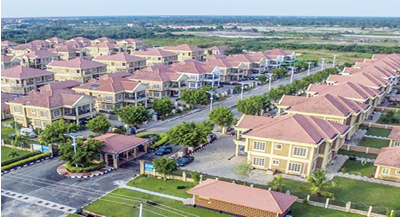The NIPROPTECH 22 held recently in Lagos with professionals taking turns to elucidate on the state of Property Technology in Africa.
The convener, Dr Roland Igbinoba in an opening address said, NIPROPTECH is the largest conference that connects different generations of real estate practitioners to collaborate and share insights in developing the Nigerian real estate market and providing superior customer experience for all users, through the use of technology across all aspects of the real estate value chain.
Property Technology is the intersection of technology across the real estate value chain. PropTech is growing rapidly in market size and it is making a compelling case for the transformation of real estate across the globe. The global real estate technology market size was estimated at $11.7B in 2022, and is projected to grow at a compound annual growth rate of 12.5% to reach $23.79B by 2027.
The value of investments in the global PropTech industry is expected to grow by an average of 5.2% to exceed $85Trillion over the next 20 years(2022-2050). Globally, there are now more than 6,000 proptech startups and statistics reported that global proptech investment increased from $2B in 2013 to $18B in 2018. PropTech startups raised $18.7B across 598 deals blw 2017 & 2019, with the numbers of PropTech transactions increasing by 33% from 187 in 2017 to 250 in 2019. In Q1 2022 VCs recorded $1B invested in proptech which is a 41% jump from Q4, 2021.
He said Fintech is the most active sector in the African continent. But guess what follows finTech? It’s Proptech.
Africa’s Proptech sector is catching up with the rest of the world. In the last few years, interest about the African Proptech industry has grown both from investors and entrepreneurs’ perspectives. Major Proptech accelerators have participated in the African Proptech sector the previous year alone. In September 2021, Spleet and Estate Intel got into the MetaProp Accelerator Program In New York. Small Small Technology got into Techstars Toronto and In 2022, RedSwan CRE got into Aldar Program in Dubai. These Proptech startups are all based in Nigeria. ARM Labs Techstars Accelerator program has recently launched in Lagos with the intention of investing in early-stage Proptech & Fintech startups in Africa. Up to 12 startups will be selected on an annual basis.
He said real estate is notorious for being a late adopter of technology, despite being the World largest asset class.
According to Crunchbase, the global ratio of Proptech to total VC funding averages at a disappointing 5%. This means for every $1M in VC funding globally, $50,000 goes to Proptech.
Since 2019, Africa Proptech ratio has hovered between 0.3% and 0.6% of total VC funding, significantly less than the global 5% benchmark.
With $4.3B VC fundraise in 2021 for Africa startups , only $13.8M or 0.3% of the total , flowed to Proptech.
According to Unissu, the Africa Proptech sector raise $18M in 2019.
Nigeria Proptech startups are also seeing some growth in the market. As of 2021 , startups in the space have secured over $2M in investments. There are over 70 active Proptech startups in Nigeria alone according to an August 2021 PropTech Nigeria survey.
Alternatively, using an approximate Africa Commercial real estate value of over $600 billon as a guide, and leaning on global ratio , one would expect $1,056B of VC funding to have flowed into Africa over the past 3years, instead we have seen just $29.9M.
The Truth about housing in Africa
By 2050, none of the world’s biggest cities will be in China, Japan or the US.
Africa’s population growth will triple by 2050 and the biggest cities will emerge from the continent.
Africa, a diverse continent with roughly over 1 billion inhabitants with 54 countries, a major challenge is the shortage of affordable housing.
According to recent reports, an October 2021 UN statistics indicated the housing crisis in Nigeria, a nation with over 200 million inhabitants (as of 2020) is estimated to have 22 million housing gaps.
Kenya has a housing gap of approximately 2M homes with a population of 53.7M ( as of 2020).
South Africa has a deficit of 3M housing units with a population of 59.3M(as of 2020).
What does this all mean?
“PropTech” is the key infrastructure needed to solve our housing problem at scale.
Proptech will not Increase the supply of housing, but it will definitely increase housing accessibility by optimizing the existing housing stocks.
Africa’s Proptech startups are now looking beyond low-tech property search. There are bigger opportunities, definitely Proptech tackling property verification, construction optimisation and costs, rent financing, Coliving, property and facility management, tenant experience, blockchain, VR, big data, AI, 3D printing are tools that can solve our housing problem at scale.
Proptech is gaining traction globally, and we are going to see the scale-up of many Africa Proptech startups in the next 2-5yrs once this startups are able to pilot.
One thing that is certainly needed for Proptech startups to grow into scale-ups is a symbiotic collaboration between the startups and the real estate industry.
A major barrier to the growth of Proptech in Africa is the heavily fragmented and localised real estate market.
Founders in this part of the world have a-lot of work to do.
Nonetheless we have to build Africa’s PropTech industry , not because it is easy , but because it is hard, and the challenges is one that we are willing to accept , one we are unwilling to postpone, and one which we intend to win.
































